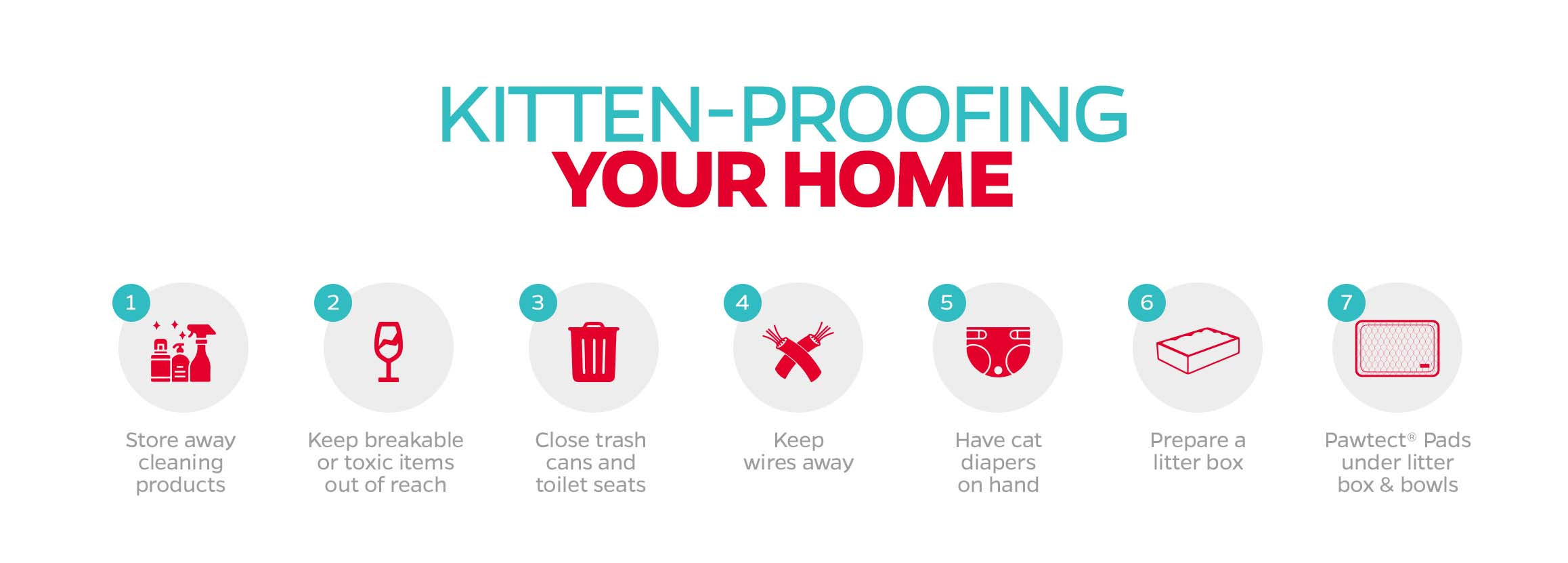Raising a kitten can be hard work, but incredibly fulfilling. Because even though cats are considered to be more independent than your other pets at home, kittens will be dependent on you to help them with their needs, and to keep them safe & secured. So, we have put together a guide of things to do before bringing a kitten home, how to take care of a kitten, basic kitten needs, how to raise a kitten, and things to consider for your new kitten.

"In raising a kitten well, the very important thing to consider is that you are able to provide them their basic needs—healthy food, water, shelter, vet care, and nutrition."
In this article, we will discuss how you can raise a kitten to become a loving, healthy, and happy adult cat. Here are some topics you will need to be familiar with to know how to raise a kitten.
Preparing Your Home for Raising Your Kitten
The first step in knowing how to raise a kitten begins before you even bring them home. Here are some tips for how to raise a kitten in a safe, comfortable environment in your home.
How to Kitten-Proof Your Home
Raising a kitten can be very tricky, especially because most of them are mischievous. This is why you have to go through the process of kitten-proofing your home. Before, bringing a kitten home, make sure you have a kitten-proof house. Here are some new kitten checklist tips on how to kitten-proof a room:
- Store away all items and objects that may be harmful to your furbaby, like household cleaning products.
- Keep breakable items, poisonous plants, and items that may cause choking hazards out of your kitten's reach.
- Tightly close lids of trash cans and toilet seats.
- Learning how to kitten-proof wires is a big one! Use plastic cord management covers or you can simply encase the electric cords in plastic wire wraps. Keep any loose wires such as phone chargers away when not in use.
- Have Pet Parents® Cat Diapers on hand for your kitten to wear until they are potty trained. Young kittens still do not have full control of their bladder and bowel, making accidents is a major issue when raising a kitten. Pet Parents® Washable Cat Diapers will help keep your furbaby and home dry and mess-free. These diapers for cats are made with soft non-abrasive WickQuick® proprietary fabric that wicks away liquid fast. These are also available in different sizes so your kitty will definitely have something that will fit them right. Plus, you can avoid the strong cat urine smell in your home.
- Prepare one or more litter boxes in a quiet location of your home. You will want to start potty training your kitten and getting them used to the idea of using a litter box. You can use these tips for training your kitten to use a litter box.
- Place Pawtect® Pads under litter boxes, food bowls, and water bowls to prevent messes. These washable pads will save you from messy clean-ups as you go through the process of potty training a kitten or spills from food and water.

Prepare Your Other Pets
Now that you know how to take care of a kitten that you are bringing home, it is time to consider the other furbabies in your home. In raising a kitten, you also have to consider your other furbabies’ needs as well. If you have other cats or dogs at home, you have to make sure they are in a good health condition before you introduce your new kitten to them.
When introducing them, allow a few minutes every day for your pet to approach your kitten. If you have a dog, make sure they are on a leash for the first introduction. Sniffing each other is normal but if one or both of them shows hostility or aggressiveness, separate them immediately and try again after a few hours or days. Never leave your kitten alone with your other furbabies until they have been well-acquainted with each other. This may take some time, especially if your pet at home is territorial but just keep on trying and remember to reward both of them if they show good behavior.
Bringing a Kitten Home
Just like how you deal with being somewhere new, your kitten feel will also need their own time and personal space to adjust to things. Whether the kitten is from a mama cat’s litter or from the shelter, new kittens may act shy or scared in a new home environment. It can be very exhausting for them, so forcing them to adjust immediately is better avoided in kitten care.
According to PAWS, the best way how to raise a kitten is to not overwhelm them with attention and demands. If you have other pets at home, it’s best that you isolate other animals temporarily, with small windows of time together for gradual introduction. It’s also best that you introduce your family members one at a time and teach them how to gently and calmly interact with your new kitten.
Allow your new kitten to get accustomed to their new home and new family members at their own pace. This will greatly help lessen their anxiety and prepare them for an exciting settling-in.
Start With the Basics
In raising a kitten well, the very important thing to consider is that you are able to provide them the basic needs of kitten care. The three basics in how to take care of a kitten are shelter, vet care, and good nutrition.
Shelter and Kitten Beds:
All kittens are different and raising a kitten is different from one pet parent to another. Some of them prefer staying outdoors, some indoors. Some of them love to stay in a crate, while others do not. Kittens need a safe, stress-free place for them to rest, like a kitten bed. Depending on their preference, you need to be able to determine what makes them feel safe and secured. A suitable shelter for your kitten must be:
Vet Care & Kitten Vaccines:
Choose a trusted local vet and make an appointment a few days after your kitten has arrived home to begin a kitten vaccine schedule. Make sure you let your vet know that your kitten is new. Your vet will educate you on vaccinations, check-up schedules, and make clear any questions you have about kitten care.
Many new pet parents wonder when to take a kitten to vet checkups. In raising a kitten, a typical kitten vet schedule will require veterinary visits usually every 3 to 4 weeks until your kitten are about four months old. Vaccinations and deworming are also required. According to VCA Hospitals, a kitten vaccine schedule usually begin between 6 to 8 weeks. Kittens will then receive a repeated vaccination after 3 to 4 weeks and again until the kitten is roughly four months old. A regular kitten vaccine booster will then be given yearly after that in most cases.
It’s important to note that kittens are only considered vaccinated if they have received the first complete round of vaccinations. After that, your furbaby will be protected from the diseases that the vaccine covers, like feline parvovirus, cat flu, and rabies. If your kitten has received none or only one round of vaccines, it’s best that you don’t let them go out yet and don’t allow them to interact with other animals (especially strays). Kittens who have not yet completed their kitten vaccine schedule are at higher risks of contracting diseases. The cost of kitten vaccinations will vary at different vet practices, but you can ask your vet for a cost quote for a kitten vaccine schedule when setting up your appointment.
Kitten Nutrition:
Nutrition is key in raising a kitten, so make sure that you are providing a kitten food that meets all the requirements for a growing furbaby. Growing kittens need three essential nutrients for their overall health: protein, calcium, and fat.

Protein is used by kittens for energy and they will require more of certain amino acids for building blocks of muscles and fuel bodily processes for their growth and development. Protein is most required by younger kittens but the need decreases as they grow up. A raw diet consisting of either meat from muscles and organs of poultry, rabbit, or fish is a great source of protein. You may also provide high-quality commercial high-protein cat foods that can come from fish, chicken, beef, or lamb.
Calcium is needed by kittens for proper bone growth. As calcium is categorized as an electrolyte, it can also be used by your kitten’s body to improve the fluid concentration in cells, managing energetic drives for their day-to-day activities. Good sources of calcium include finely crushed eggshells, organ tissues, dairy, and legume plants.
Fat provides your kitten’s body insulation and protection for internal organs. As mentioned by the experts at VCA Hospitals, fat is a good source of essential fatty acids and is actually a concentrated source of energy that contains fat-soluble vitamins.
Some other things to consider when feeding a kitten:
- You can choose what to feed a kitten. There are quality wet kitten foods and dry kitten foods with different formulas that can each provide benefits for kittens. Just make sure you are able to give them food that supplies all their nutritional needs in different stages of their lives. For kittens in their first year, they will need more calories and protein in their kitten food than an adult cat’s diet.
- Provide fresh and clean water at all times that are placed in water bowls in different accessible locations in your house.
- According to the American Society for the Prevention of Cruelty to Animals® free-choice feeding can be done for kittens. This is when you make food available all the time so your kitten has the freedom to eat whenever they want. But this feeding method is only suitable for dry kitten food, which will not easily spoil if left untouched. Do not leave wet kitten food out.
It is very necessary to watch your kitten’s development and how much you feed your kitten. If free-choice feeding is leading to an obese cat, you will have to adjust your kitten feeding schedule. Giving them too much food can lead to obesity and orthopedic problems. If you have any questions about your cat’s body condition, your vet can help!
Spaying or Neutering
Benefits of Spaying and Neutering Kittens
Learn about spaying or neutering for kitten care. Having your kitten spayed or neutered soon will have them enjoy life-long benefits, like:
- A healthier, longer life as they will have lesser risks of developing urinary cancer, testicular cancer, and uterine infections
- Curbed bad behaviors, like a lesser urge to escape and roam around looking for a mate, aggression, dominance-related behaviors
- Helping your community decrease the number of stray cats caused by accidental breedings
- Avoiding heat cycles in female cats, which generally start around six months of age
Note that an intact cat should not be allowed outside unsupervised. If you have an outdoor cat or an indoor/outdoor cat, spaying and neutering is the responsible thing to do to prevent unwanted pregnancies.
When should a kitten be spayed or neutered? Generally, between four to five months of age is a good time to spay or neuter your kitten. Contact your veterinarian to know more about the process and the right time to spay or neuter your kitten.
It takes effort, patience, and some knowledge to know how to take care of a kitten. Pet Parents® is here to help with quality supplies to assist with kitten care. Raising a kitten, especially for the first time pet parent, can be challenging. However, it can be incredibly rewarding to watch your kitten grow up into a healthy, happy adult cat that you love. Follow these tips for raising a kitten and how to care for a kitten and enjoy seeing your furbaby to grow up into a beautiful, confident cat.
"Have your kitten wear Pet Parents® Washable Cat Diapers; young kittens still do not have full control of their bladder and bowel, making accidents is a major issue when raising a kitten."










